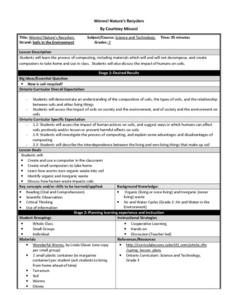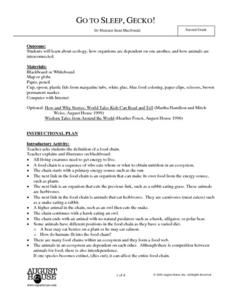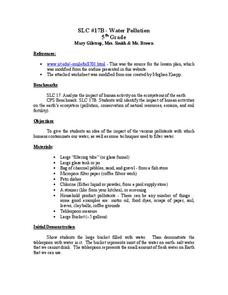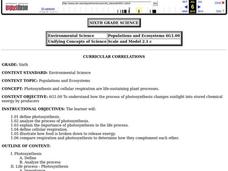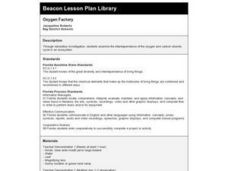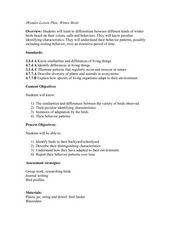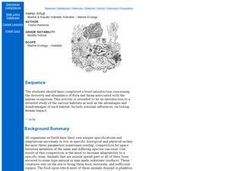Curated OER
Acid Rain
Create a simulation of acid rain in your classroom with lemon juice and bean plants to help kids study the effects of pollution on plants. In addition, learners will listen to a story and write responses based on guiding questions.
Curated OER
Photosynthesis and Respiration
Pupils comprehend the relationship between plants and animals in an aquatic ecosystem. They predict the effects of low dissolved oxygen on the organisms. Students create microcosms with plants, animals, or both. They determine which...
Curated OER
Worms, Nature's Recyclers!
Students study what worms need to survive in different environments. They study how worm composting improves soil and reduce waste. They discuss composting techniques and present a puppet show about a worm's life.
Curated OER
Marshland Wonders
Students review the characteristics of wetlands and list their benefits. After viewing short videos, they identify the organims that make their home in wetlands and how they have adapted. They compare and contrast the characteristics...
Alabama Learning Exchange
Nature's Life Cycle
Become a member of the Pollution Patrol and stand up to litter! After discussing the life cycle of seeds and discussing how plants figure into the food chain, young conservationists engage in several activities involving podcasts,...
August House
Go to Sleep, Gecko!
A cute folktale from Bali tells the story of Gecko, Elephant, and Buffalo, and Gecko's struggle to sleep. After reading Go to Sleep, Gecko, learners focus on comprehension questions, singing and learning about geckos, building a house...
Curated OER
Insects: Bug Off
Students design and conduct an experiment to test three organic pesticides to control ants. They view a video that demonstrates ant behavior and the role of pesticides in insect control. In small groups, they set up behavior...
Curated OER
Lakes and Ponds
Students describe and recognize the difference between a lake and a pond. They name six ways in which a lake or pond can be formed. They describe the importance and act of evaporation on a waterway.
Curated OER
Dinosaurs 1: Where Are the Dinosaurs?
Students explore the time of the dinosaurs. In this extinction lesson, students watch a video clip about different dinosaurs and are asked about what they observed. Students talk about how dinosaurs hatched from eggs and compare that...
Curated OER
Groundwater as Part of the Water Cycle
Ninth graders study the effects of soil and rocks on filtering groundwater. In this groundwater lesson students complete a lab activity that includes sources of contamination.
Curated OER
Does the increased use of fertilizers effect biodiversity?
Students conduct a hands-on lab activity in which they analyze a sample of water from a local stream or pond. They introduce a fertilizer solution into the sample and analyze and describe their findings.
Curated OER
Water Quality Tests Explained
Students define all eight water quality parameters and list at list one source for each of the eight water quality parameters. They determine how each of the eight parameters affect river ecosystems.
Curated OER
Great Salt Lake
Fourth graders make an ecosystem that brine shrimp can live in and take data as to what level of salinity the water is, how cold it is, and other data that students may think is important. They also hypothesize and predict the outcomes...
Curated OER
Ecology and the Conservation of Natural Resources
Learners examine the components of ecosystems. They compare and contrast an ecosystem to an aquatic ecosystem. They examine a local ecosystem and discuss its components.
Curated OER
Beaver Ecology
Students explore the lives of bgeahvers. They identify the physical and behavioral adaptations that help beavers survive in their environment. Students compare and contrast how beavers influence the ecology of both forest and aquatic...
Curated OER
All About Ants
Students create model ants in order to study the characteristics of insects such as body segments, number of legs, and feelers, as well as how these characteristics serve the insect.
Curated OER
Water Pollution
Fifth graders investigate how humans pollute the water supply with a number of different contaminates. While working in small groups they examine screening, sedimentation, filtration, and chemical treatments as methods of water treatment.
Curated OER
Water Pollution
Fifth graders observe and record what happens when household products are added to a tank of water to depict water pollution. They brainstorm ideas of how to clean the contaminate out of the water before watching demonstrations of...
Curated OER
Photosynthesis
Sixth graders are introduced to the process of photosynthesis by discussion and then by participating in an experiment. They then answer questions as independent practice project.
Curated OER
Oxygen Factory
Fourth graders examine the interdependence of the oxygen and carbon dioxide cycle in an ecosystem through a laboratory investigation. After a lecture/demo, 4th graders complete the lab in groups.
Curated OER
Science: Where the Worms Live
Students build mine-earthworm habitats to discover their niche in them. They make predictions about what the niche looks like in a week and draw a picture of it. Students notice the tunnels in the soil and how the sand and dirt are now...
Curated OER
How Hot is Too Hot?
Fifth graders use the scientific method to conduct experiments on the temperature effects on organisms. In this temperature effects on organisms lesson plan, 5th graders observe and record the hatching or the developing of organisms into...
Curated OER
iWonder Lesson Plan: Winter Birds
Students report on the colors, calls, behaviors, and physical characteristics of different winter birds. In this winter birds lesson plan, students also make a bird feeder.
Curated OER
Marine & Aquatic Habitats Activities - Marine Ecology
Middle schoolers enact the life cycle of a sessile animal and quantify the possibility of survival under the conditions given. They then present to the class a new adaptation which will increase the animals chance of survival.




